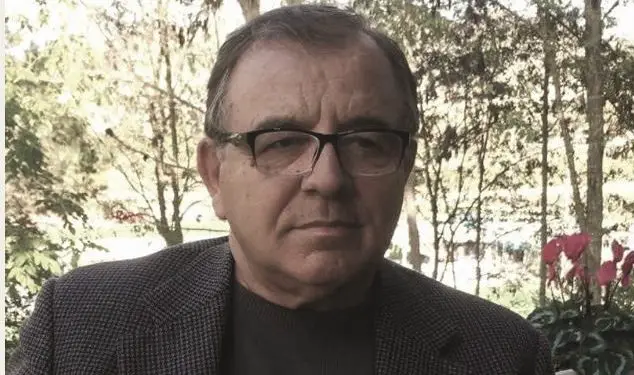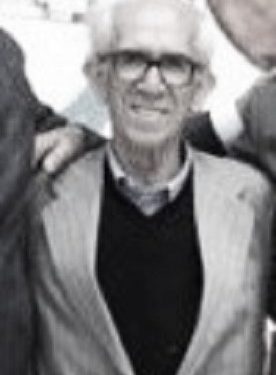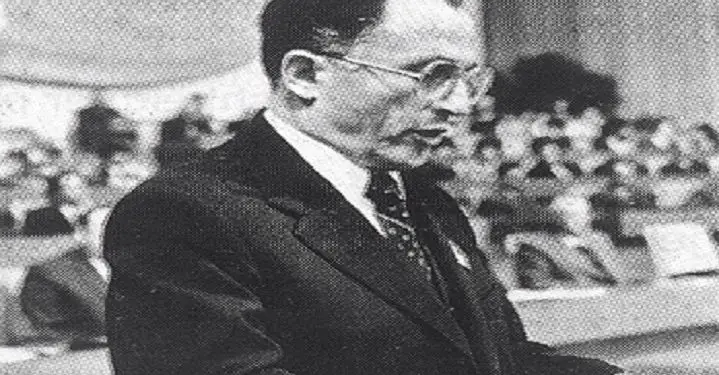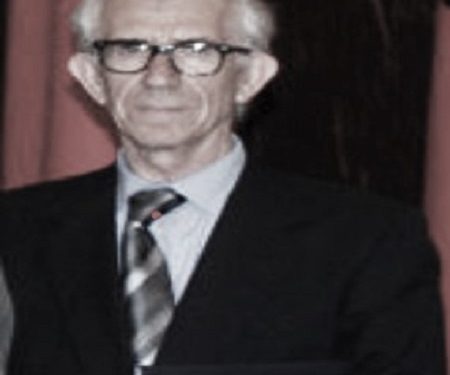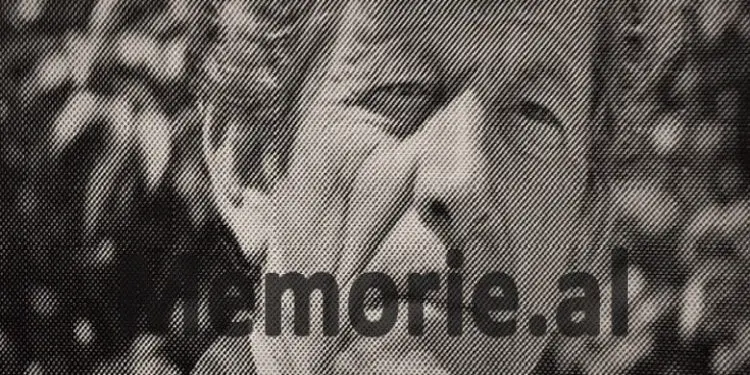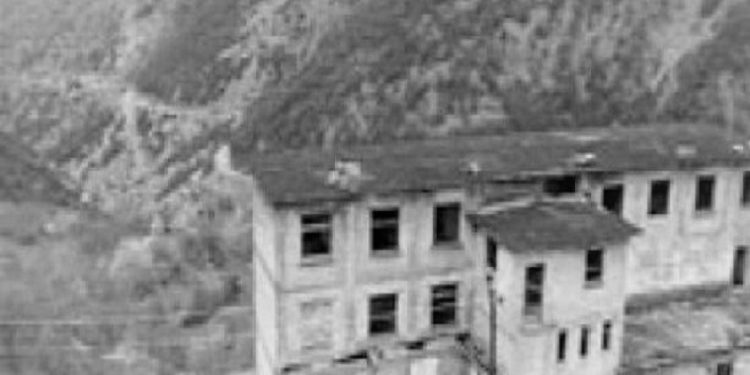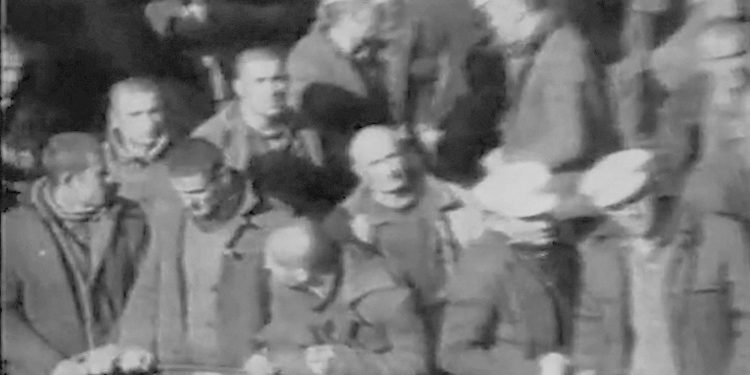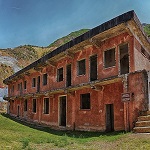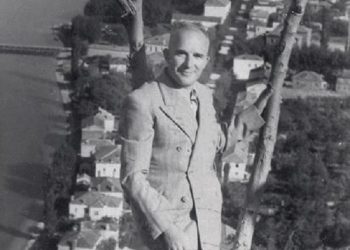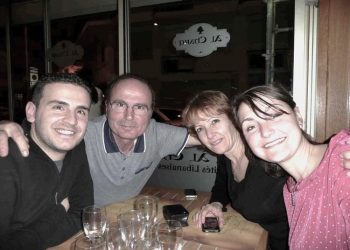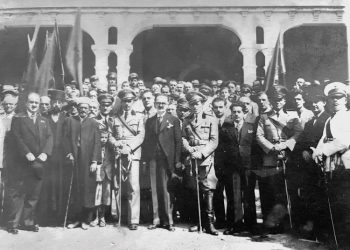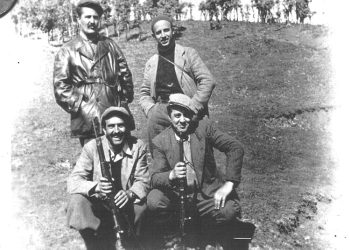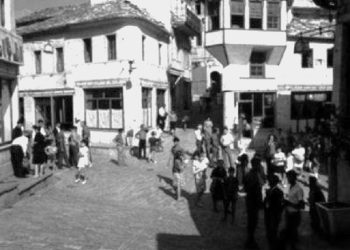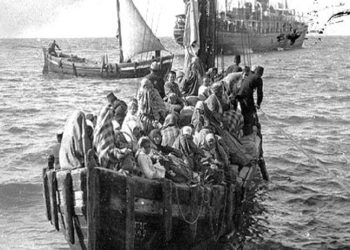From Bashkim Fishta
Memorie.al / One of the persecuted of the communist dictatorship, Bashkim Fishta narrates what happened in the prison of Spaç, in the distant May of 1973, the revolt of the prisoners and how four prisoners were shot without trial. A few years ago, he published a shocking book with memories under the title “Liberty in bars”. But, beyond the book, he also has many impressive memories, which really complete a picture of a hellish life. Along with many other books published by former political prisoners, this one by Bashkim Fishta is undoubtedly one of the best, as it stands out for its realism and analysis of that period.
What were the demands of the rebelling prisoners of Spaçi, the dialogue of the former deputy interior minister Feçor Shehu with his fellow villager Hajri Pashaj and what happened next with the organizers of that rebellion?! The name of a former football player, who was the most terrible torturer of Bashkim Fishta before his re-conviction, due to the Spaç revolt. All this in this confession of Bashkim Fishta.
Memories of Bashkim Fishta, about the Spac Revolt
It was like the explosion of thousands of mines together, like the collapse of a dam of a powerful hydropower plant, it seemed like the unexpected and uncontrolled explosion of a volcano, this was also the assessment that the communist dictatorship gave from the very first steps, to what was stigmatized as the ‘Spac Revolt’. None of the prisoners could endure the injustices of that dictatorial regime indefinitely, the cup could no longer hold, the adrenaline that was slowly pouring out, could no longer be restrained, we could foresee the consequences of our behavior, but nothing could stop us, the uprising had begun. We could even die under the barrages of the guards, but at least for one day, one single day, we managed to give a meaning to our lives, just for one day!
About three hundred prisoners rushed against the guards, forcing them to retreat, hand to hand, all the other prisoners took heart, and in a short time, the number of the insurgents, increased from three hundred, to one thousand and one hundred; at that point, no one could back down; we were all involved in hand-to-hand combat with the police force.
At one point, Bedri Çoku, an intellectual from Fieri, imprisoned together with his two brothers, as a political opponent of the regime, approached me and said: “Let’s do something so that these bastards don’t forget it easily, today is the day most important thing of our life, come, let’s do something Unity”. What a story of Bedri. A family destroyed by the regime. His father, sentenced to eleven years in prison, with the lawsuit: “enemy of the people”.
Bedriu and his younger brother, Çaushi, expelled from the city of Fier and sentenced to forced labor (internment), until the day they had to leave for forced military service, during which they were tried and sentenced to twenty-five years each, sentence that they would both serve in Spaçi prison. Recently, as if to put a lid on it, even the eldest brother, Esati, was sentenced to eight years in prison, for agitation and propaganda, against the government. (After the fall of the regime, Bedriu, released in 1991, settled in Tirana, where he is still today, while his brother Çaushi, has stabilized in Rome with his family, the others in Fier, in their hometown) .
After a short consultation, in which three other comrades, Hodo Sokoli, Luan Koka, Luan Burimi and Nuri Stepa, also participated, it was decided that the first step would be to open the isolation cells. The source, Bedri Çoku and I, were charged with this task, as delicate as it was dangerous, to get the convicts out of those isolation dungeons, guarded night and day, by a dense network of firearms, it was more than madness, yet there was no time for much thought; crawling to the barge, we reached the barbed wire, we began to dig a little, so that we could slip under the barbed wire, possibly without being noticed by the guards, who, with all the chaos, kept the isolation cells under their sights .
Finally, being helped by other comrades, we managed to give a signal to the comrades in isolation, so that they were ready to leave the dungeons at the first signal. Luani e Bedriu, with the help of a bolt, were able to blow open the doors of the isolation rooms, there were about twelve people isolated, the guards had dictated to us, the automatic volleys began to be fired in the direction of the isolation rooms, luckily for us, the corner that we had chosen to empty the dungeons, it was protected from machine gun fire, from the hostel where we political prisoners slept.
The fear was great, but luckily, we all came out unharmed from this stupid initiative. The insurrection was going well for us, it was bearing its fruits, the truth that none of the officers, or service policemen, ever thought that a crowd of prisoners, tortured to the core, without food, would have still power, to oppose “their party”, with that determination, to the point of self-denial.
What was happening in Spaç i Mirdita had never been seen in any prison or forced labor camp? The dictator was shocked, in order to “pacify the enemy rebels”, he had sent the Deputy Minister of the Interior, Feçor Shehu, to Spaç, accompanied by the commander of the Burrell Corps, at the head of a military force armed to the teeth, consisting of special rapid intervention troops, up to tanks and small armored vehicles, for mountainous terrain.
The territory of Spaç was subjected to three strict sieges by the troops of Burrell’s Corps, no one dared to enter the territory of the prisoners! An attempt was made by a Special Forces officer, but failed, to enter the territory of political prisoners with his men. They say that he paid dearly, receiving very serious wounds on his head, this incident was taken as a signal that the political prisoners were very angry and determined to take things to the end.
Around twenty o’clock in the evening, a loud voice coming from a very powerful megaphone ordered all the convicts to enter their dormitories within twenty-one hours. Whoever disobeyed this clear order would be shot. That’s what the life of a political convict was worth!
None of the comrades moved, we all sat on that terrace, probably with a lot of fear in our hearts, but still, without moving from the place, even from the other side of the barricade, no order to open fire was given. We stayed on the terrace all night long.
It was a wonderful spring night. Well they say that in the spring, the blood is renewed, and so it happened, although we were in front of a very difficult situation, thousands of thoughts crossed my mind, I almost started to dream, we were proud, that at least that night, we were free to decide not to we slept, to smoke a cigarette, without being afraid that Preng Rrapi would see us, we were free to speak loudly, or to remain closed to myself, because even this gesture, or action, was very dangerous for the regime.
At least for one night I was humbled, I was a free man. Free for one night only. Tomorrow?! Eh, tomorrow… surely something will happen, for better or for worse, I don’t know, but I’m sure something will happen, we were all aware that our venture would irritate them authorities and would retaliate to the point of reprisal.
We were very afraid, but this very fear gave us the courage to continue. In the morning of May 22, 1973, the command started the first distractions, to deceive our comrades, and it achieved its goal, ensnaring two to three people, locking them directly in the special isolation rooms. It was immediately understood that their goal was to hit us one by one, until the final surrender, but our response was immediate and determined; only the dead could lay hold of us, we will never yield to your malicious wishes. But the physical and psychological war was slowly gaining ground.
A young man, from among the prisoners, Skender Daja, turned to a soldier in the bodyguard, asking him, “Why are you looking at me so intently”?! The soldier answered in a low voice and with great fear, (behind the wall of the terrace, from where we were leaving for work): “I see you, but it seems to me that you are the same age as me.” And Skenderi, in the same tone, answered: “Yes, I, like you, at this age, should have been in military service, but unfortunately, I have been locked up here for three years and I have seven more left, for suffering. But do you know what is happening here”?! The soldier answered: “They told us that they are in revolt, some twenty or thirty people, and that they should be stopped, that they are mentally ill.”
Then Skenderi started to laugh out loud, unfortunately their conversation was followed by another bodyguard.
Immediately after this episode, all bodyguards were replaced with prison service police, and their positions were tripled. Under these conditions, as the situation worsened, we were very afraid that they would start surrendering one by one, and this would be the end we did not want.
Thus, we had arrived in the afternoon of the second day, Mersin Vlashi, a friend of ours who has been imprisoned for years, proposes to us to unfurl a national flag, without a star, hammer and sickle, which did not belong to our traditional flag, with two-headed Albanian, which had demonstrated its values with its waves, since the time of Skanderbeg. Mersini insisted that we absolutely need a symbol of ours to present us as a group of people who also fight for national dignity.
After a short consultation among friends, Mersini’s proposal was liked, it was decided that the flag should be placed on the roof of the dormitory, but the main problem was the lack of such a flag, Mersini himself had previously thought about solving this problem, a red quilt cover was needed, which was found without much problem, then the author, being the “painter” that he was, stamped a large black eagle in the center, without the symbols of communism in the center.
A great idea, the flag turned out really nice, it soon became our symbol. We tied it with a long broom tail, raised it with an impromptu ceremony in the place where it was predicted, (emotions even today make my hands tremble as I write these few lines). The eagle, a symbol of power and unassailable freedom.
Throughout the night, between May 22 and 23, 1973, our flag flew freely in the sky, without the symbols that had been added to it for political interests, which made the regime and its representatives, already outside the camp, extremely angry. From Feçor Shehu, the command of the prison, there were constant calls to remove that “cloth”, but that night he waved calmly, during the night there were also exchanges between the camp staff and the prisoners.
In the morning of May 23, special troops of the “Chemistry” department managed to throw a significant amount of tear gas; this put all the prisoners in a great panic, it was impossible to fight, in our conditions, against an enemy invisible. Slowly our hands and feet started to feel heavy.
And the most undesirable moment came, the Special Forces went into action without problems, for us it was a terrible situation from the psychological point of view, because you watched your enemy approach you with a certain gnashing of teeth, and you, you were not in able to play even the little finger of the hand. We stood like zombies, despite the great desire to react, it was impossible.
After this “ceremony” of tying all the prisoners, hands and feet, was over, the President of the Supreme Court, Aranit Çela, who personally presided over the judicial body, appeared on the stage. He was a convicted criminal and loyal to Enver Hoxha’s regime. A criminal who had signed over 800 death sentences, already executed. Two hours later, Feçor Shehu, Deputy Minister of the Interior, announced the decision of the Supreme Court; as follows:
Death penalty, (by firing squad) on charges of insulting state officials, inciting soldiers to mutiny, fatally wounding national security personnel, organizing prohibited gatherings against the popular government. The President of the Supreme Court, Comrade Aranit Çela, decided: execution by firing squad without appeal, of the defendants: Hajri Pashaj, Dervish Bejko, Skënder Daja and Pal Zefi. For the other two convicts, the court will decide, together with those who will be arrested shortly.
But the truth was quite different: Hajri Pashaj (who was a fellow villager of Feçor Shehu) was sentenced to death, because he had the courage to seek and defend to the end, his opinion, for the rights of political prisoners, which also showed during the development of the uprising, in the face of the Deputy Minister of the Interior, regarding the rights and implementation of international laws for political prisoners, to whom he said: “We want your government to allow an international commission to can closely verify the concrete situation and the hygienic-sanitary conditions, the economic conditions in which political prisoners are fed and treated in Albania, almost inhumane conditions, both in the workplaces and in the dormitories”.
Then the Deputy Minister asked him: “Tell me, convict, why did you raise the national flag, without its symbols, the red star, hammer and sickle”?! And Hajri Pashaj, did not hesitate to answer him; “It is our National Flag, the two proud eagles, it has always been its symbol, the star, the sickle and the hammer, you have added to it, after the formation of the Communist Party and without asking either formally, in a plebiscite, the other parties and special our people. Why did four young men, aged between 21 and 31, have to be shot? Why? Once again they could not hide their tyranny, their heartless and endless cruelty!
Second Sentence
… May 23, 1973: After a very long journey, the effect of the gas that had for so long blocked our limbs, but not really clouded our vision, finally wore off, allowing us to see and focus in our brains, precisely, everything happening around us. The mind had been working for a long time, releasing all the darkest thoughts to the most ominous sensations.
The paralyzing effect of the gas had given way to a general pain in the bones, suddenly we heard the loud banging of a heavy iron railing, the cars stopped, a powerful voice announced that the place we were in was Ward 313. That very ward, from which I left for Spaç i Mirdita, starting after the first sentence, in that yard, where the regulation allowed us one hour of airing per day. But this time, we arrived without our feet touching the ground, punches, kicks and screams, accompanied us to our “beloved” isolation cells.
I don’t remember exactly what happened those days. Sometime later, a friend told me that they had beaten me so much, with punches and kicks, that even the other inmates of the cell did not recognize me, because my face was so bruised and covered in blood, that after a few hours, managed to freeze, leaving in our memory, indelible marks of a harsh and cruel treatment.
All the presidents of the Branches were called, but what I felt the most were the punches and kicks of a football player, it was M.B. What delusion?! My friends, although they also received the same treatment in those days, fortunately, still had the strength to take care of me and two or three others, who were probably physically weaker, but we were in a worse condition.
No one dared to talk about what had happened, for fear that some “bad ear” could hear our conversations, maybe we didn’t really want to remember what happened in those three or four days, the severe pain, maybe not they let us think. The pains that came and increased, throughout the body, were not the same as those we felt when the effect of the paralyzing gas wore off, no, those pains also had the marks of many sticks that could have been broken on our body, the marks of which took years to disappear.
The violence against us in those days was truly savage. The teeth that were left in my mouth, counted with the fingers of one hand, were four in total. Those were days of black terror, we often thought of ending our lives, maybe that’s why we started the hunger strike, because the conditions in the isolation regime, and the torture inflicted on us, were unbearable. The difficulties increased, because in each cell, even in the normal investigator, there were no more than four detainees, we had packed at least 12 political convicts in each one of them.
… After thirty days, we were transferred to the isolation rooms of Rreshen in the district of Mirdita. In those dungeons, we would wait for the process that would take place against us, in the center of the district, where the terrible Spaçi prison is also located. It was another difficult stage, another challenge that I had to overcome on my way to freedom.
I assure you that after fifteen days, no one would be in a physical and psychological condition to face a process of vital importance, no one would have the opportunity to defend themselves from the attacks of the Prosecutor of the Republic, from the attacks of the judges, because those tried, you were not allowed to have a defense lawyer, and we in that situation described just above, we had to defend ourselves, it was almost impossible.
Chewing cheese for fifteen days in a row, our cell was filled with water bubbles, every time we talked some of them burst, it was a torture in itself, many times I expressed the opinion that a treatment should have been provided in their program such food. Maybe I’m exaggerating, but I say with conviction that no one would be able to handle such a process.
Our four friends (Hajri Pashaj, Zef Pali, Dervish Bejko and Skender Daja) were shot, even without any process, even though it was prescribed. I felt guilty as much as they did. Why not judge them, why kill them in that way?! Just to scare us. I always think about them, I can never forget them; they have paid with their wet lives, the punishments of all of us.
July 15, 1973. The courtroom was very close to the investigation, however, the sun was scorching, the cheese we had eaten made us very thirsty for water, in the courtroom, we were arranged so that each defendant was between two policemen, so for fifteen of us, thirty policemen were also present in the hall.
A process began, both farcical and cynical. I say farce, because they already knew the pre-prepared conclusion of the decisions coming from Tirana, they were also convinced of the futility of that process, and I, along with them, knew well its conclusion. And the District Prosecutor of Mirdita, Zef Deda, informs the “public” of the main points of my lawsuit. “Baskim Tosum Fishta is accused of:
– As an agent of an international criminal organization;
– As one of the organizers of the failed uprising;
– For high treason against the state;
– As the inspirer of a revolutionary organization, against Enver Hoxha. For these lawsuits, I ask the jury to sentence the defendant in question to forty-six years in prison. And with a combination of articles, with 25 years in prison”.
The same procedure, the same charges, the same agenda for the other fourteen prisoners, the only difference was the number of years that would be added to each of us, the jury retired to make its decision. After a few moments, a spokesperson of the court announced that the decision would be given after five days…!
Who is Bashkim Fishta?
Bashkim Fishta was born on August 30, 1945 in Allajbegi, Dibër. Orphaned by his father, he spends the first four years in his hometown, and then moves to Tirana. In 1968, he had just finished the Technical Institute, he was arrested on the charge of “high treason against the country”, and sentenced to 15 years in prison, to which another 10 years were added while serving the sentence, because in the Spaçi revolt, was on the front line. He was released from prison in 1989. He currently lives with his family in Italy. Memorie.al




